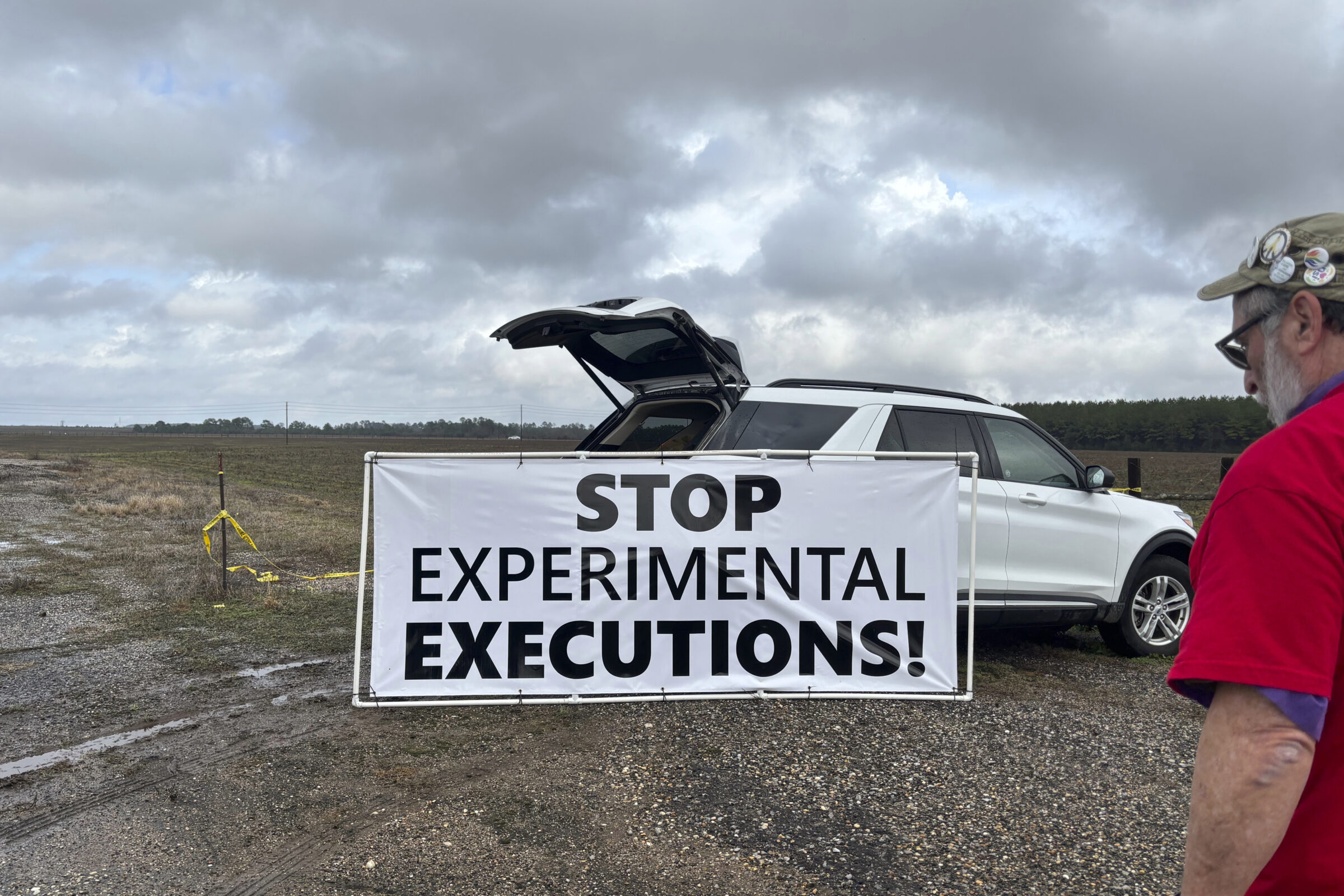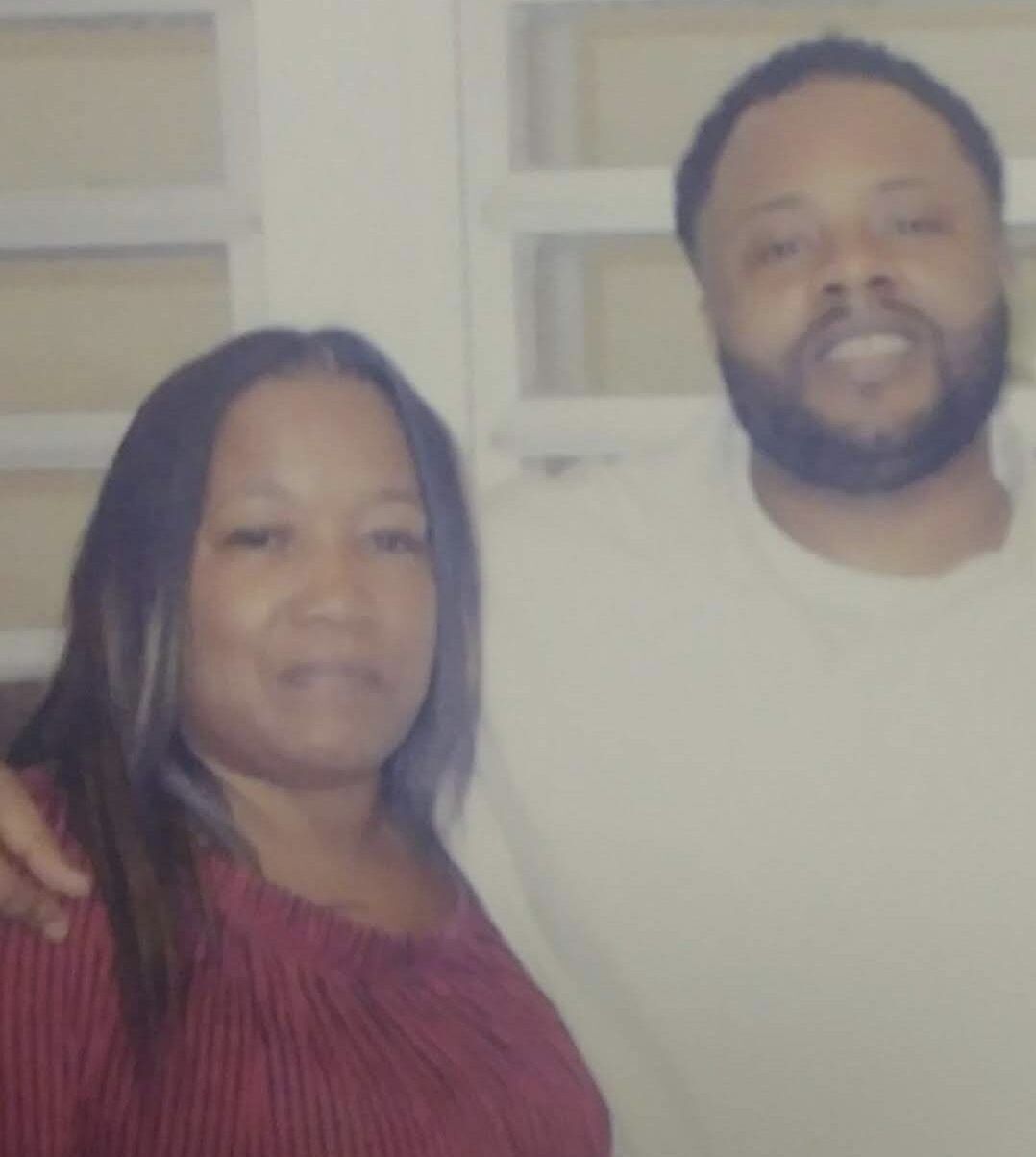In Alabama, Prison Guards Accused of Violence and Misconduct Carry Out Secretive Executions
As the state keeps details around the death penalty hidden, an investigation into its execution team raises questions about how incarcerated people are treated in their final moments.
| September 24, 2024

This article was produced as a collaboration between Bolts and The Intercept.
As the leader of Alabama’s execution team, Brandon McKenzie is sometimes the last person to touch a prisoner while they’re still alive. He has played a key role in executions, directing a team of around a dozen prison guards on execution nights and performing tasks that can impact how long it takes for someone to die or whether they feel pain.
Alabama prison officials gave McKenzie these responsibilities even after a prisoner accused the guard of smashing his head through a window, then driving him head-first into a concrete floor.
The injuries McKenzie inflicted were severe and lasting, according to a federal civil rights lawsuit filed by the prisoner, Lawrence Phillips, in May 2020. Phillips lost consciousness and was taken from Holman Correctional Facility in Atmore to a Mobile hospital. Medical records show he was treated for bleeding in his brain and received sutures, staples, and a neck brace.
“I’ve not been the same since, and my memory fades in and out at the time,” Phillips wrote in his complaint. “I have nightmares, accompanied with post traumatic stress from the fears of this happening to me again.”
McKenzie, who was promoted to captain two months after Phillips filed the lawsuit, claimed that he was acting in self-defense; attorneys from the state who represented the officer wrote in a legal filing that Phillips “angrily lunged” at McKenzie, who reacted by “using his elbow to protect himself and push inmate Phillips away, and they then collided with a glass window nearby.” Another incarcerated person who witnessed the altercation submitted an affidavit supporting Phillips’s account.
McKenzie didn’t respond to questions from Bolts and The Intercept about his role in executions or the allegations of abuse from Phillips.
While the Alabama Department of Corrections, or ADOC, ultimately concluded that the use of force was warranted, Katherine Nelson, a federal magistrate judge, thought the lawsuit against McKenzie should proceed. In a report and opinion denying the officer’s effort to resolve the case before trial, she wrote that a reasonable jury could conclude “that the force was applied maliciously and sadistically to cause harm, rather than in a good faith effort to restore or maintain order.” Court records show that in August 2023, McKenzie’s state lawyers and Phillips settled the suit. The settlement terms were not disclosed.
Meanwhile, McKenzie kept his job as captain and has overseen recent executions. That position earned him more than $135,600 last year, according to pay records reviewed by Bolts and The Intercept.
An investigation by Bolts and The Intercept into Alabama’s execution team shows that McKenzie isn’t the only execution team member who has previously been accused of violent behavior or mistreating incarcerated people. Earlier this year, Bolts and The Intercept were given a list of names of ADOC staff members on the execution team from a lawyer who asked not to be named out of fear of retaliation. Bolts and The Intercept have independently verified 14 names on the list through interviews, court records, and personnel files.
The records reveal that one officer on the team previously faced discipline for leaving a man hanging in his cell instead of cutting him down. Another member drunkenly attacked a jail guard in Florida. ADOC found that both of those men violated department policy.
Even after these incidents, ADOC allowed both of these officers to participate in executions, each earning more than $100,000 last year in a state where the median household income is around $62,000. One of them has been promoted since his infraction. The other was demoted.
Death penalty experts say that even these officers’ role on Alabama’s execution team raises questions about how incarcerated people are treated in their final moments. They say the officers’ backgrounds also hint at a culture of impunity among prison staff tasked with carrying out death sentences and reinforce concerns about Alabama’s ability to conduct executions as a regulated legal proceeding.
Allowing these men to work executions “shows a disregard for the sanctity of the task of carrying out an execution,” Brian Stull, a senior staff attorney with the American Civil Liberties Union’s Capital Punishment Project, told Bolts and The Intercept. “A system that cannot be trusted to keep prisoners safe is a system that should not have the right to kill,” said Alison Mollman, legal director at the ACLU of Alabama.
Problems with the conduct of those who carry out executions in Alabama extend to leadership at Holman, a maximum security prison that houses death row inmates and the state’s death chamber. In 1999, the prison’s warden, Terry Raybon, was fired from his job as a state trooper after two women accused him of domestic violence. No charges were filed against him. Under state law, Raybon is the executioner and is responsible for pushing lethal drugs and starting the flow of nitrogen gas.
Pointing to Raybon’s history, Mollman called the findings of Bolts and The Intercept’s investigation “unsurprising.”
ADOC did not respond to questions sent for this article, nor did the state attorney general and governor’s office. The execution team members named in this article also did not reply to requests for comment. Isaac Moody, another execution team member whose personnel record contained no history of violence or mistreatment, picked up the phone but was quick to end the call.
“We’re not allowed to talk to any media,” Moody said. “There’s an oath, code, we take. We don’t speak about it. I could lose my job.” When asked if the code was administered by the department, he said “yeah” and then hung up.
The identities of the people involved in executions are a well-guarded secret.
Fourteen states have enacted secrecy statutes to shield information about executions from the public since 2010. While Alabama has not passed such legislation, it remains “among the worst” states for execution transparency, says Robert Dunham, the director of the Death Penalty Policy Project.
ADOC has kept details of how Alabama carries out executions and the people behind them hidden. The state did not release its execution procedures until 2019, when it was ordered to do so by a judge. Even then, it only released a heavily redacted copy of the process the execution team is supposed to follow. State officials still continue to tightly guard records detailing the actors who carry out executions and fight in court against releasing information about their capital punishment practices.
The members of Alabama’s execution team are not medical or science professionals, and they work among the people they execute. Together, the team is supposed to ensure that death sentences are carried out as outlined in the state’s execution procedure manual by performing a series of tasks. In lethal injections, for example, some of these team members will secure the person to a gurney before a separate team, composed of medical personnel, sets IV lines. Despite their significant roles, the majority of their activities are performed in secret without witnesses.
Dale Baich, a federal public defender who represented death row prisoners for more than 30 years, stressed the importance of knowing the identities and personal histories of execution team members. “You don’t want someone who has a history of being abusive toward prisoners,” he said. “You don’t know if the person who is assigned to do the job is qualified.”
The backgrounds of execution team members have taken on more importance as the state argues to the courts that it should be allowed to continue to carry out death sentences with nitrogen gas, a method it first used when it executed Kenneth Smith in January. Under the method, the execution team carries out technical responsibilities such as monitoring oxygen levels and assembling equipment used to administer lethal gas, according to the state’s execution protocol.
Smith’s execution did not go as promised. Officials had said in court that Smith would lose consciousness “seconds” after the nitrogen began flowing. Instead, he writhed and thrashed in “seizure-like movements” for two minutes, according to The Associated Press, which was present. Another witness called it the “most violent” execution he’d ever seen. Alabama Attorney General Steve Marshall had a different opinion, calling the execution “textbook” and a “historic achievement.”

Alabama is now poised to conduct a second death sentence with nitrogen on September 26, when it will execute Alan Eugene Miller, a man the state tried and failed to execute via lethal injection in 2022.
Miller’s lawyers have claimed the nitrogen method violates their client’s constitutional protections against cruel and unusual punishment. The state has responded by relying on testimony from McKenzie, the execution team captain, to argue that the state’s first nitrogen execution went as planned.
McKenzie, who was inside the death chamber for Smith’s execution and fitted the respirator mask to his face before the nitrogen gas started flowing, submitted an affidavit in July. Contrary to the statements of media witnesses, McKenzie wrote in his legal filing that “I did not see Smith make any violent or convulsive movements.” Miller’s lawyers later poked holes in McKenzie’s account, noting that the guard “miraculously” made very specific claims about Smith’s oxygen levels seven months after the fact, despite “routinely not remembering other information related to the execution during his deposition,” and questioning whether he could have even seen the levels during the execution.
McKenzie is also involved in ensuring that executions do not violate constitutional protections against cruel and unusual punishment. During lethal injections, for instance, a team member is tasked with ensuring the person being executed is unresponsive after a sedative is administered so they don’t feel the pain of the following two drugs that will paralyze them and stop their heart. To do so, the team member is supposed to say the person’s name, brush their eyelids, and pinch their arm to determine whether they need more of the sedative before receiving the lethal drugs—a process that Bolts observed McKenzie perform during the execution of Keith Gavin in July.
As ADOC proceeds with nitrogen executions, Dunham, of the Death Penalty Policy Project, noted that the inconsistencies between the department’s narrative and witness testimony in executions over the last few years underscores the need for more transparency.
“Alabama officials have shown significant impairment in telling the truth that other people observe,” Dunham told Bolts and The Intercept. “When you have a state that has a history of secrecy and a history about lying about things that other people have seen with their own eyes, that tells you that oversight is critical.”
When Tarji Jackson’s nephew, Jamal Jackson, died by suicide on Alabama’s death row in 2020, she said Alabama prison officials didn’t call her about it, even though she was listed as next of kin. Instead, she learned the news through another family member. When Tarji called Holman, she was connected to the prison’s chaplain. “All I know is that Jamal hung himself,” she told Bolts and The Intercept. “They told me no details on nothing.”
An ADOC investigation later concluded that Christopher Earl, a then-lieutenant and member of the state’s execution team, had disregarded protocol for prisoner suicides. ADOC demoted Earl in 2020, finding that he did not immediately cut Jamal down or seek medical assistance, despite department policy instructing guards to first cut the ligature and give medical workers a chance for lifesaving measures. According to department records, Earl first ordered a nurse to go back to the infirmary before asking him to return to the cell, where Jamal’s body was left hanging for nearly 12 minutes after Earl first spotted him.
Afterward, Earl left work before Jamal’s body was picked up by the ambulance service, in violation of ADOC’s protocol for the deaths of incarcerated people.
Then-ADOC Commissioner Jefferson Dunn determined that Earl had committed four infractions including inattention to the job, noncompliance with policies and procedures, serious violation of the rules, and “disgraceful” conduct.

Since Jamal’s death, much of Tarji’s family has died, including her younger sister. She is still trying to understand what happened to her nephew but does not think Earl should have kept his job.
“For him to see my nephew in there, hang in and not do anything, and he’s still working. He should not be working. He shouldn’t even be at a desk in there,” she told Bolts and The Intercept.
Earl again was found to have violated ADOC policy a year later after he left three incarcerated people unsupervised in outdoor cages for three hours. He was suspended for three days. “The intent of this action is to emphasize the necessity for you to follow rules and regulations,” wrote Dunn in another letter to Earl. “Any similar infractions after this incident will result in further corrective action. Hopefully, your actions in the future will meet standards.”
Earl made more than $127,000 last year, according to pay records.
Bolts and The Intercept sent questions about Earl’s conduct to an email account and phone number associated with him. The email went unanswered. In response to the text messages, someone who identified herself as his wife said she would not ask Earl to get in touch and threatened a lawsuit if the news organizations contacted other numbers associated with his name.
“Sure we can set that up sometime between the hours of fuck off and never,” she wrote. “In case you didn’t know with the exhaustive amount of information you are able to access at the click of a button, members of an execution team don’t usually go on record.”
None of Earl’s violations have prevented him from participating in executions. Prior to the state’s attempted lethal injection of Alan Miller in 2022, Earl stood outside of Miller’s cell and alerted him that it was time to go to the execution chamber, according to a legal filing.
Miller is one of six U.S. prisoners to have survived his execution in the modern death penalty era. Three of those failed executions occurred in Alabama since 2018.
During the state’s attempt to execute him, a prison guard hoisted the gurney vertically, leaving Miller, who weighed around 350 pounds, hanging in the air for 20 minutes. Eventually, Earl approached Miller and told him the death warrant had expired and guards ordered him to get off the gurney, according to a legal filing detailing the events of that evening. His body was so stiff that he asked the officers to help him bend his arms. Alabama officials never explained the maneuver, but it was not sanctioned in the state’s execution protocol that’s been publicly released.
In July, Miller sat for a deposition as part of a lawsuit he filed over Alabama’s plan to kill him with nitrogen. “I don’t concur with being gassed by incompetent people,” Miller told lawyers with the Alabama Attorney General’s Office. During the deposition, a state lawyer said that McKenzie, who had participated in the previous attempt to execute him, would be responsible for fitting the mask used to deliver the gas. Miller’s legal team has asserted that an improper fit would increase the risk of Miller suffering.
“It’s incompetent people fitting it,” Miller said during his deposition. “They need to be professionals, medical professionals, a third party or somebody, you know, like—are these people that are going to fit it, what’s their training?”
Alabama started executing people with nitrogen gas after a series of long and bloody lethal injections that appeared to deviate from ADOC’s execution protocol. Days after officials called off the execution of Kenneth Smith in November 2022, Governor Kay Ivey ordered a moratorium on executions and called for a review of the state’s capital punishment system.
After just three months, Alabama wrapped up its “top-to-bottom” review of protocols in February 2023. In a letter announcing the evaluation had been completed, ADOC Commissioner John Hamm wrote that the department had reviewed its legal strategy on capital litigation, training procedures, and equipment on hand during executions. The two-page letter contained few details about the review and did not mention whether there would be increased oversight of ADOC staff who worked executions. One of the agency’s only significant changes was adding more medical personnel to participate in executions.
The agency has refused to release its full assessment.
As a prison guard working on death row at Holman, Halle Lambert says she was given the chance to join Alabama’s execution team. She declined. “It was not part of my beliefs,” Lambert told Bolts and The Intercept.
Lambert worked at Holman from September 2022 to November 2023, when she was arrested and fired for bringing in cigarette lighters and a cellphone. Prosecutors have alleged that she planned to sell those items. Lambert has pleaded not guilty, and the case is ongoing.
During her time at Holman, Lambert learned who was on the execution team because she worked at the prison on execution days. In an interview, she confirmed the identities of team members whose names were provided to Bolts and The Intercept, including Bruce Finch, another officer with a history of arrests and discipline for violating ADOC policy. Finch also participated in the nitrogen execution of Smith in January, according to an eyewitness who asked not to be named out of fear of professional retaliation.

Court records show that Florida police arrested Finch in November 2019 for trespassing outside a concert by heavy metal band Five Finger Death Punch in Pensacola, just over the state line. According to a police report, Finch became “belligerent” with officers who had first given him a warning and ordered him to leave. Police took him to the Escambia County jail, where he grew so agitated that a guard eventually pepper sprayed him.
Finch then charged at the guard and slapped him on the shoulder. The guard tried to handcuff Finch, but Finch “grabbed his face with his hand covering his nose and mouth,” making it difficult for the guard to breathe, according to the report. The fight escalated so much that another jail guard went into the room and tased Finch.
Prosecutors charged him with battery on a law enforcement officer, a third-degree felony that carries a maximum sentence of five years in prison and a $5,000 fine.
Finch pleaded no contest to the charges, and four months after the arrest, a prosecutor agreed to not seek a conviction so long as he met certain criteria—such as undergoing evaluation for substance use, attending anger management, abstaining from alcohol, and paying a $100 fine. By mid-October of 2020, a probation officer said that Finch had completed his pretrial intervention program and sent the case back to prosecutors to dismiss the charges.
Finch, however, did not report the incident to ADOC, which eventually learned of the arrest. In May 2021, the department suspended him without pay for three days for failing to report it and other violations of the agency’s code of conduct.
Bolts and The Intercept found that Finch had been arrested other times as well.
According to his personnel file, he was arrested for driving under the influence in Texas in 2017, for which he completed a pretrial diversion program. Another DUI, in Atmore in 2018, was dismissed.
In January 2024, Florida police arrested Finch for drunk driving, writing in a report that he “continuously swerved” on the road and had an empty beer can in the center console of his car when they pulled him over. Records state Finch was “obviously unsteady on his feet” during a field sobriety test and blew .147 and .138 on a Breathalyzer. The legal limit is .08.
In May, he was sentenced to a year probation under the conditions that he undergo substance use evaluation, doesn’t drink alcohol, and submits to random urinalysis tests. His driver’s license was also revoked for six months.
ADOC paid him more than $104,000 last year, pay stubs show.
According to Lambert, Finch joined Alabama’s execution team after he was promoted to lieutenant at Holman in November 2022. She said some of the team members are retired prison guards who come back for executions.
It was previously unknown how Alabama selects its execution team. No one on the state’s squad has ever gone public. The few available details about team members and their experiences have been limited to staff in other states who have spoken to the media.
In Alabama, staff volunteer to be on the team and the existing group votes on who can join, Lambert said. She said there’s no financial incentive to join, aside from overtime pay.
Curious about why her colleagues would be a part of executions, Lambert said she asked about their motives. She said one execution team member told her he could feign PTSD and retire early. She said another officer, who was a devout Christian, told her that he was “doing justice.”
Sign up and stay up-to-date
Support us
Bolts is a non-profit newsroom that relies on donations, and it takes resources to produce this work. If you appreciate our value, become a monthly donor or make a contribution.




